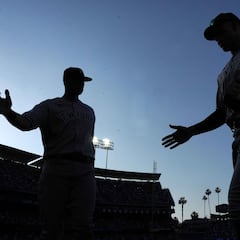FIFA expert urges MLB to invest in international infrastructure
Executive involved in delivering 2022 FIFA World Cup in Qatar, Alexey Milovanov urges MLB to invest in international stadiums to grow game.


Ahead of the London Series this weekend, one of the executives at FIFA World Cup Qatar 2022 has called on the MLB to turn their gaze to investing in infrastructure as a step to increasing global interest in the game.
Alexey Milovanov lists among his achievements being an advisor to the President of the Russian Olympic Committee, overseeing the compliance of Russian sporting facilities with FIFA requirements for the 2018 FIFA World Cup, and most recently organizing the overlay and event infrastructure for eight designated stadiums during last year’s FIFA World Cup in Qatar.
A self-confessed baseball fan, Milovanov points to the announcement by MLB for future games to be held in France, Japan, Mexico, the Dominican Republic, and Puerto Rico while raising concerns that the struggle to find adequate infrastructure may undermine MLB’s expansion attempts.
The World Baseball Classic in January demonstrated that there is a large and growing international appetite for the national pastime, and this London Series is the second such series to be held in the British capital following the success of 2019’s instalment. Covid put a temporary halt to the plans, but MLB and the city of London have done a deal which will see the series return for the next three years at least.
LONDON STADIUM IS A BALLPARK NOW⚾️
— Shawn Spradling (@Shawn_Spradling) June 16, 2023
The transformation for the London Series next weekend is almost complete! 🇬🇧 pic.twitter.com/RyPsj38L5o
One issue plaguing the effort, says Milovanov, is the unsuitability of most available stadiums for an MLB game. “The current lack of infrastructure is capping the amount of progress baseball can make in its global ambitions. The MLB must put serious resources and effort behind new infrastructure, whether it’s delivered with other investors or construction partners, if it wants to create a genuine baseball culture abroad and lay the foundations for its future growth.”
Pointedly indicating the retrofit status of the London Stadium, normally a soccer stadium for West Ham United, Milovanov continues, “Baseball professionals often have to play in stadiums that aren’t designed for their sport when they play overseas. This undermines the spectator experience in games that are designed to attract new fans. Furthermore, baseball series are forced to work around other sporting events, meaning fans get fewer opportunities to see the sport.”
With the recent creation of Baseball United, a new professional baseball league based in the Middle East and South Asia, the region is seen as ripe for the plucking, and MLB has indicated repeatedly that their ears are definitely pricked at the thought of bringing baseball to a wider audience.
“We’ve seen how important high-quality sports infrastructure is in football, the Qatar World Cup being a prime example,” says Milovanov. “Without these stadiums, I don’t believe that [soccer] would be enjoying such popularity in the Middle East at the moment.”
Related stories
Of course, the biggest question in the construction of any sporting facility is how it will be used the rest of the time. Without finding a partner sport; and cricket would seem to be the most natural ally of baseball in terms of stadium needs; it can be a tricky prospect.
MLB adamantly wants to focus on Latin America and European capitals, with London, Mexico City, and Paris confirmed, with the Stade de France set to be retrofitted much as the London Stadium has been.

